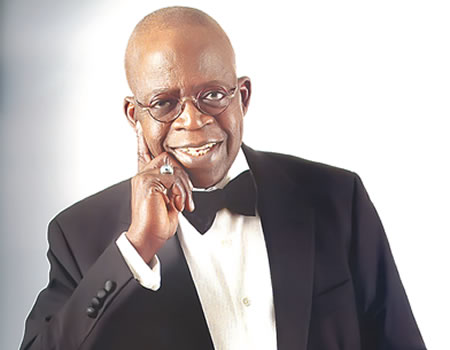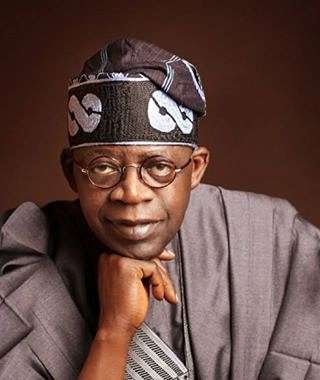Once leading player in Nigeria’s private sector, Asiwaju Bola Ahmed Tinubu, born 29 March 1952, a leading political figure in Nigeria. Emerging as Lagos State governor in 1999, Tinubu has left landmark achievements for history to judge him by. Key to this success was the strong leadership of Governor Tinubu in promoting the development of the BRT system in a holistic way by investing in infrastructure, reorganizing the management of the bus industry, financing new buses, training drivers and enforcing the rules for its safe operation. The success of the Lagos BRT system exceeded expectations, eventually carrying over three times the projected number of people, leading to further investment and development of the system with additional buses and more routes served. The Lagos BRT system offers considerable gains to people who not only save on travel cost and travel time, but also are safer.
At a time when most cities were pursuing automobile-dependent urban transport planning, Governor Tinubu’s leadership in promoting mass public transport represented a radical and visionary shift towards safer, cleaner and calmer cities. In his own words: “The mass transit option for public transportation remains one of the drivers of growth for Lagos and must continue to top the agenda.”
“Out of the socio-economic and political fog that 2010 represented, at least three great themes emerged: the struggle between the search for democratic legitimacy and subsisting electoral injustices; the tenacious resolve of courageous characters who dared hypocritical authority to prove points of principle; and a pervasive sense of self-doubt as the nation marked its 50th anniversary of independence.
“Within this context, the year spawned a welter of heroes and villains from various arenas of human endeavour. But while some forces remained apostles of socio-political stagnation and retrogression, others represented untiring catalysts for progressive change. It is from this puzzling canvass that we must make our choices as to which personality impacted Nigeria most, for good or bad, in 2010.
“As it were, justice still remains the country’s most powerful idea, but the struggle is far from over. After almost twelve years of unbroken democracy, impunity at various levels of governance remains a defining feature of our national life. The successful reversal of some of the subsisting injustices, within the period of this assessment, through the influence of some courageous individuals, in the face of dangers to life and limb, sets Bola Ahmed Tinubu apart as a leader of note. Through his tenacity and uncommon focus in guiding the reversal of electoral impunity across a wide swath of the nation’s political landscape, he reaffirmed the enduring fact that, indeed, justice is the first condition of democracy.”
Those are the words of one of Nigeria’s leading newspapers, LEADERSHIP, based in Abuja, the country’s Federal Capital Territory, on the publication’s choice of Asiwaju Bola Ahmed Tinubu, as the person of the Year 2010. The newspaper stressed the widely acknowledged role of this relentless fighter for democracy, justice and the rule of law in the reversal of electoral impunity and the restoration through the judicial process of stolen electoral mandates in such states as Edo, Ondo, Osun and Ekiti in the Federal Republic of Nigeria.
Coming three years after he had left office in Y2007 as two-term Governor of Lagos State, the award by this credible medium demonstrates that Asiwaju Tinubu remains one of the most influential, courageous and principled politicians and statesmen in contemporary Nigeria. In a political culture where most members of the political class tend to gravitate towards the ruling party for pecuniary reward, Tinubu’s resilience and steadfastness in giving inspirational leadership to the opposition is remarkable. It is a testimony to the depth of the convictions that have motivated and sustained him in politics over the last two and a half decades.
The virtues of courage, determination, commitment, vision, focus and strong sense of purpose that have characterised Asiwaju Bola Ahmed Tinubu’s politics were no doubt responsible for this extraordinary politician’s emergence as one of the country’s most successful governors since Nigeria’s return to democratic governance 12 years ago. On his assumption of office as Governor of Lagos State in 1999, Asiwaju Tinubu inherited a state that was practically bankrupt. The country’s commercial nerve centre was one of the worst victims of the previous one and a half decades of military dictatorship and neglect.
Public infrastructure had disintegrated abysmally. Delivery of social services had collapsed in virtually all sectors. The environment was in chaos as Lagos was routinely described as one of the dirtiest cities in the world. The state was largely dependent on insufficient financial allocations from the centre as she lacked the capacity to generate adequate revenue internally to meet her numerous challenges.
The public sector was demoralized and ill-equipped, psychologically and logistically, to effectively perform its functions and achieve set objectives. While the citizenry was alienated from the state and thus demotivated from paying taxes or the ones they paid being stolen making the state technically bankrupt, the organized private sector had little or no incentive to partner with the government in meeting the immense developmental challenges of the Mega City.
Assembling a team of accomplished technocrats, Asiwaju Bola Ahmed Tinubu’s Administration drew up a Ten-Point Agenda, which it began to systematically implement for the re-vitalization and re-invention of the state. The total budget size of Lagos State at the inception of the Asiwaju Bola Ahmed Tinubu Administration in 1999 was a little over N14 billion while the state’s Internally Generated Revenue was approximately N600 million monthly. Yet, the monthly public sector wage bill was N800 million. The implication was that Lagos state was entirely dependent on allocation from the centre, which was grossly insufficient to meet the huge challenge of re-building a state that had been neglected and allowed to decay for over two decades.
Eight years later under Asiwaju’s astute guidance, Lagos had become financially viable and autonomous of the federal government; lives and property had become more secure; public infrastructure was being aggressively modernized and expanded; there had been a dramatic improvement in the quality and efficiency of public health care, education, the environment, water supply and public transportation; Lagos was attracting new investment in diverse sectors on a daily basis despite the depressing national economic climate.
Today, the great legacy of Asiwaju Bola Ahmed Tinubu is built on by his successor, Mr. Babatunde Raji Fashola (SAN), who served as his Chief of Staff. Continuation of Tinubu’s outstanding policies makes the present administration of Lagos State an exceptional and the foremost Government in Nigeria.
Asiwaju Bola Ahmed Tinubu is also the Akinrogun of Lagos, the Agba-Akin of Ikorodu and the Jagaban Borgu.
Family
Bola Ahmed Tinubu is married to the equally vibrant and indefatigable Yeye Oluremi Tinubu who has just been elected as a Senator of the Federal Republic of Nigeria and they are blessed with children.
Bola Tinubu Biography And Profile (Bola Ahmed Adekunle Tinubu)



Comments
Post a Comment